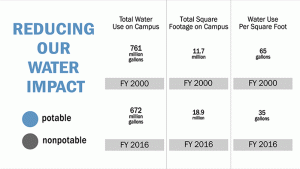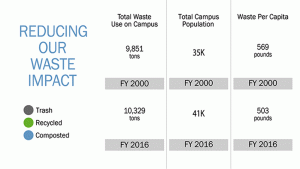Working toward a greener future
Earth Week 2017 focuses the Carolina community on the University's Three Zeros Initiative aimed at reducing it's environmental footprint.
The UNC-Chapel Hill community is marking Earth Week 2017 with a series of events across campus, ranging from a student-led celebration in the Pit to the greenhouse opening at the Carolina Campus Community Garden to the UNC Science Expo.
The work to reduce the University of North Carolina at Chapel Hill’s environmental footprint isn’t limited to just this week, though. In the fall of 2016, Carolina launched the Three Zeros Initiative, which has three overarching sustainability goals:
- Net zero water usage: finding new ways to reduce the use of drinking water and expand the use of reclaimed water (treated wastewater for non-drinking purposes);
- Zero waste to landfills: reducing the materials coming onto campus and maximizing efforts to reuse, recycle and compost discards instead of automatically tossing them in the garbage; and
- Greenhouse gas neutrality: focusing on minimizing the reliance on hydrocarbons (such as coal, petroleum and natural gas) while investing in energy efficiency and switching to renewable energy sources wherever practical.
Chancellor Carol L. Folt started the iniatitive, said Brad Ives, associate vice chancellor for campus enterprises and chief sustainability officer.
“As we worked on the campus sustainability plan, we met with Chancellor Folt, and she said we have to go big,” Ives said. “Actually, she had already formulated the idea for the University to target these three zeros.”
Carolina officials produced a sustainability plan in 2016. Guiding the campus through that process created a framework for examining sustainability efforts campus-wide and identifying ways to integrate them into teaching, research and engagement activities, as well as campus operations, said Cindy Shea, sustainability director.
“We looked at sustainability from the viewpoint of what an individual can do, what the University teaches, how we can collaborate across disciplines, how we can use the campus to model new approaches to sustainability and the impact we want to have, not only here but around the globe,” Shea said.
Three Zeros provides a way to aggregate many of those efforts, to examine what the University has already accomplished and how to build on that success.
How Green is Our Campus?
There are several Three Zeros projects in the pipeline that will be rolled out and announced over the next year, Ives said, but Carolina can already show sustainability success adding up over the past years.
Net Zero Water Usage
Investments in reclaimed water, harvested rainwater, and water efficiency have reduced Carolina’s potable water use by 63 percent per square foot since 2000. A comprehensive stormwater management program improves the quality of runoff to local streams through new practices and infrastructure. Reclaimed water is used for cooling tower make-up water and to flush toilets in new buildings and irrigate landscapes adjacent to distribution lines. Another example of limiting water usage: eliminating trays at Carolina Dining Services dining halls reduced water use by 144,000 gallons per year.

Zero Waste to Landfills
UNC-Chapel Hill strives to reduce waste going to the landfill by practicing campus-wide sustainable materials management and encouraging individual behavior change. In 2016, 47 percent, or more than 5,000 tons, of waste was diverted from the landfill by composting and recycling. The Office of Waste Reduction and Recycling hosts events that encourage students to recycle, such as move-in and move-out donation drives and Residential Green Games. Carolina Dining Services reduces waste by composting food waste produced in the kitchens and by diners and by recycling fryer oil to be used as biodiesel fuel.

Greenhouse Gas Neutrality
Carolina has pledged to be climate-neutral by 2050. As a charter signatory of the American College and University Presidents’ Climate Commitment, UNC-Chapel Hill has taken a leadership role in implementing strategies to reduce greenhouse gas emissions and the impacts of climate change. UNC-Chapel Hill’s energy use per square foot has declined by 31 percent since 2003, which equates to $330 million in avoided energy costs. Members of the campus community are reducing their carbon footprint in buildings, transportation, waste management and individual behaviors.
The efforts are getting recognized. Among other honors, Carolina ranked No. 11 in this year’s Universitas Indonesia Green Metric World University Ranking, which ranks campus sustainability worldwide and included 516 universities from 74 countries.




